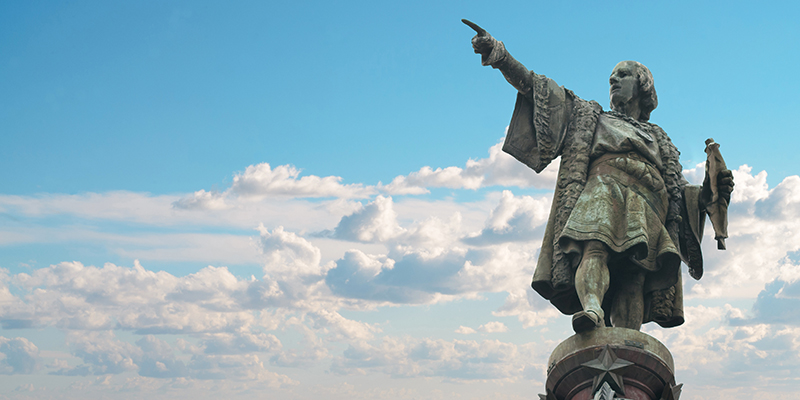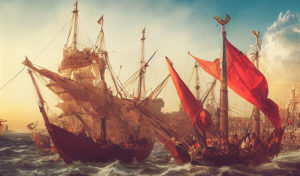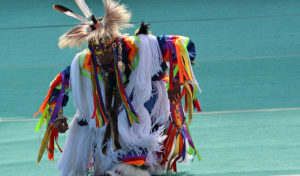What Is Columbus Day?

What is Columbus Day? As the federal holiday approaches, it is important that all Americans know the history behind Columbus Day. Here are the answers to your most commonly asked questions about the holiday.
Browse By Category
Sign up for Our Newsletter
What is Columbus Day? As the federal holiday approaches, it is important that all Americans know the history behind Columbus Day. Here are the answers to your most commonly asked questions about the holiday.
What Is Columbus Day?
Born in 1451, Christopher Columbus was an Italian navigator and explorer who is best known for his “discovery” of the New World, also known as the Americas. In 1492, King Ferdinand II and Queen Isabella I sponsored Columbus’ journey across the Atlantic Ocean.
Columbus was initially looking for an alternative route to the Far East, taking three ships with him — the Nina, the Pinta, and the Santa Maria. After months of sailing, he reached the New World.
But, what is Columbus Day?
Columbus Day was first celebrated in 1792 as a way to honor the 300th anniversary of the explorer’s arrival. In 1892, President Benjamin Harrison declared it a one-time national celebration after a mob lynched a group of Italian immigrants in New Orleans.
It was not until 1907 that Colorado first officially recognized it as a state holiday. Then, in 1934, President Franklin D. Roosevelt officially made it a national holiday.
What Day Is Columbus Day?
 Columbus Day initially took place on October 12, the date of Columbus’ arrival in the New World. Today, however, the United States celebrates the holiday on the second Monday of October every year. Interestingly, many federal holidays fall on a Monday.
Columbus Day initially took place on October 12, the date of Columbus’ arrival in the New World. Today, however, the United States celebrates the holiday on the second Monday of October every year. Interestingly, many federal holidays fall on a Monday.
This is in keeping in line with the Uniform Monday Holiday Act, which passed in 1968. The bill sought to change the dates of a handful of federal holidays so that they fall on a Monday. The goal was to give employees more three-day weekends throughout the year. Other federal holidays that fall on a Monday include Memorial Day and Labor Day.
Why Celebrate Columbus Day?
The original meaning behind Columbus Day was to commemorate the arrival of Columbus in the Americas and to honor the explorer’s achievements. As Columbus was Italian, it also became a day that celebrates Italian-American heritage.
However, the holiday has been marred by controversies surrounding the history of the Italian explorer’s arrival. While some celebrate Columbus’ “discovery” of the Americas, others point out the atrocities committed by the explorer and his Spanish enterprise that came soon after.
His arrival in the New World led to the enslavement and deaths of countless Indigenous people as well as the loss of the Indigenous ways of life. In addition to his violent rule, Columbus’ arrival also introduced diseases, led to the forceful seizing of land, and forced the natives to convert to Christianity.
While several states and municipalities still celebrate the holiday with parades and other events, others have replaced it with a day to commemorate Native Americans. Some celebrate both Columbus Day and Indigenous Peoples Day. There are also those who ignore the holiday altogether.
Is Columbus Day a National Holiday?
Yes, it is a national holiday in many countries across the Americas. The Dominican Republic, for instance, celebrates it as The Discovery of the Americas. Several Latin American countries also commemorate the holiday as Dia de la Raza or Day of the Race. Spain also celebrates the holiday on October 12 as Día de la Hispanidad or Fiesta Nacional.
In the United States, Columbus Day is a federal holiday. There are only 10 holidays that the federal government recognizes, one of them being Columbus Day.
Despite its status as a federal holiday, though, Columbus Day is inconsistently celebrated. In fact, it is also the least observed federal holiday. Most non-essential government agencies and banks shut down on this day, and many schools also don’t have classes. But, a vast majority of businesses remain open.
Is Columbus Day a Holiday in All States?
While Columbus Day remains a U.S. federal holiday, not all states observe it. By the end of the 20th century, celebrations of Columbus Day began to wane.
Several states no longer recognize Columbus Day as a state holiday, replacing it instead with Indigenous Peoples’ Day or Native American Day. South Dakota was notably the first to do this in 1990. Other states that don’t observe Columbus Day include Alaska, Maine, Vermont, Hawaii, and New Mexico.
Some parts of California also no longer celebrate the holiday. In Washington and Oregon, Columbus Day is no longer an official holiday. And then there are states that celebrate both Indigenous People’s Day and Columbus Day. Interestingly, in 2021, President Joe Biden issued a proclamation that made October 11 of that year to be Indigenous People’s Day.
The decreased importance of the holiday is largely attributed to Columbus Day’s controversial past. Many people view Columbus as a vicious colonizer instead of a celebrated explorer. He brought death and anguish to the natives of the Americas. He took their homes and ways of life. As such, a number of places have launched movements to replace Columbus Day with Indigenous People’s Day.
What Is Indigenous People’s Day?
 Many states have already started to recognize Columbus Day as Indigenous People’s Day instead. Others have dedicated a separate day to commemorate the contributions of indigenous people in the United States.
Many states have already started to recognize Columbus Day as Indigenous People’s Day instead. Others have dedicated a separate day to commemorate the contributions of indigenous people in the United States.
On a global scale, Indigenous People’s Day is also celebrated. The International Day of the World’s Indigenous Peoples is held on August 9 each year. It aims to support the rights of indigenous people all over the world and celebrates their achievements.
What Is Leif Erikson Day?
Leif Erikson Day takes place on October 9 every year. The day honors the eponymous Norse explorer and his gang of Vikings who were thought to be the first Europeans to have arrived in North America.
Although the federal government has not designated Leif Erikson Day as a federal holiday, many states and cities celebrate it. The city of Seattle has long recognized it, while Las Vegas has celebrated it many times. Some cities even hold festivals to commemorate the explorer.
Recognizing Columbus Day
Columbus Day has a long, often-controversial history behind it. While it remains a federal holiday, many places have stopped honoring Christopher Columbus and replaced it with other celebrations. To know if your city observes the holiday, make sure to check your city website.
RELATED ARTICLES:
- HOA Religious Discrimination: What The BOD And Homeowners Should Know
- Can An HOA Ban Fireworks?
- How To Prevent Crime In Your Neighborhood & Increase Resident Safety
Trending Now
Related Article
Sign up for Our Monthly Newsletter
Sign up below for monthly updates on all HOA Resource

















